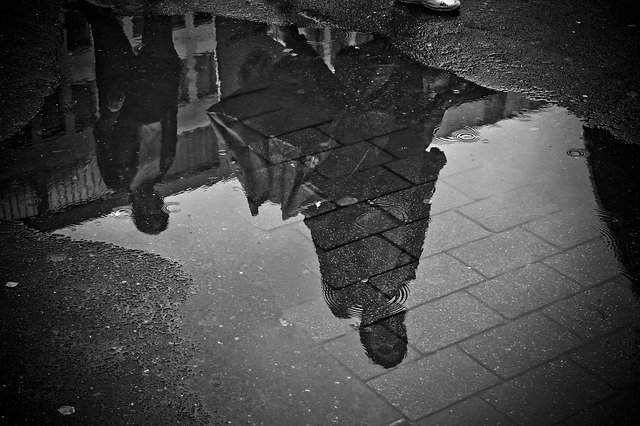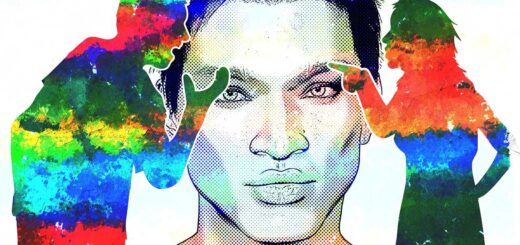A Promise to Leila by Gregory E. Lucas

A Promise to Leila by Gregory E. Lucas
On her deathbed, Leila Adams raised her withered hand and stopped a tear streaking her husband’s furrowed cheek. “Promise to remember me without sadness,” she said. Four days later, on a windy March afternoon, Jeff Adams swore to overcome his grief and fulfill his promise to her.
Gray clouds hid the sun while he kept his gaze on his worn black sneakers and tried to summon the energy to keep walking down the cobblestone street of Old New Castle, Delaware to the park. He’d begun most days for the past thirty-five years with a walk or jog along the paths that skirted the Delaware River for several miles. His heavy eyebrows contracted as he struggled to displace memories of his wife’s suffering during her final days and remember one of their walks through Longwood Gardens, where they’d sat on a stone bench surrounded by blooming rosebushes and he’d told her for the first time that he loved her. His long white hair swirled as he crossed the street, and the sides of his unbuttoned plaid coat flapped on his lean body.
Despite the cold, plenty of people hustled to and from the town’s shops. Tourists snapped pictures of buildings where revolutionary war heroes had gathered. Others stood at the entrance to the park and admired the white ticket both that commemorated one of America’s first railroads, but Jeff gave most of his attention to the sustained wails of seagulls overhead that acknowledged his plight.
Jeff’s life-long practice of judo kept his body strong as he’d aged; a five-mile run still came easily to him, but on this morning, a mere stroll required more strength than he thought he possessed. Leila, after fifty-one years of love and marriage — gone. Memories of her golden tresses as they’d lain across her shoulders so many years back merged with memories of bright golden trails on the river created by sunrises. Her lilting voice, that had never ceased to charm him even as it had softened in her gray-haired years, had always made him indifferent to the cold as she’d strolled with him through the park on even the harshest mornings, mornings when the grim winter contended with the coming of spring, as it did now.
He shivered but didn’t bother to button-up his coat, and he stopped by a bench just before he came to the beginning of the asphalt path that kept parallel to the river. Snow patched the sward to his right where children played on jungle-jims, sliding boards, and seesaws. A game of three-on-three basketball between teenagers got underway next to the playground area, and next to the basketball game, small kids chattered during their kickball game. A little to the other side of Jeff, noisy men put up a wire fence around the border of a big concrete plaza.
Jeff stretched his arms across the back of the bench. He’d cancelled all his lessons at his martial arts studio the week that Leila died, so that he’d be with her every moment at the end, and he’d sat by the bed where they’d made love countless times, through the years. She had smiled when he stretched himself on the bed and lay tight against her. She woke up with the terrible wheezing and coughing that the lung cancer caused her. Her smart figure had withered, and she’d become more frail than a famished sparrow. Taught features and grayish skin replaced the glow in her cheeks and the milky softness of her shoulders that had charmed him until the onset of her illness.
Where she found the strength to raise her hand and brush the tears on his face, he’d never understand. Though her lips moved, no words came out at first, but she seemed to speak to him without words. That one flickering smile seemed to say don’t let all the joy we’ve shared be turned to sorrow because of missing me. Then, in a voice softer than the flutter of wings, she said, “Promise to remember me without sadness.” She gazed into his eyes for the longest time, waiting for him to vow he’d keep that promise. But he couldn’t speak. He could only hold her until her breath expired and her heart stilled.
Remembrance of his wife’s last words diminished the noises around him.
He berated himself for failing to assure Leila that he wouldn’t let her down. How could I have been so weak? Jeff asked himself. I couldn’t do anything except cry when she needed her last wish guaranteed.
On this Saturday morning he thought it was strange that so much remembered joy could make one sad. He wished that the present would slip away and be replaced by the distant past. He’d told himself as soon as he’d woken-up that he’d make himself get on with things today, at least eat a good breakfast and take a walk, the full length of the park. It would be what she’d want him to do.
A man older than Jeff sat on the beach, his hands resting on the backs of a fluffy white Samoyed and a brown cocker spaniel stretched out on each side of him. Jeff envied the companionship the three shared while a trim woman in a red jogging suit dashed past the wooden bench where he sat. Children shrieked with joy as they played their games and ran around. The murmur of the waves had always comforted Jeff, but not now; he only wanted to hear Leila’s voice once more.
Leila, read to me one more poem, one more, — that’s all. No one’s voice sings like yours when you read poetry. He pictured her removing a book of poems from the bookshelf, like she’d done on so many nights before they’d gone to sleep. The cold wind at the park gave way to the warmth of all those nights when the two of them settled under the covers and her musical recitations of Shakespeare’s sonnets, Wordsworth’s Preludes, and countless other poems delighted him. Her voice from years ago blended with the children’s chatter. He pictured her setting a book of romantic poems on the bedside table, turning off the light.
The sonnet about loving someone better after death, Leila — that one, can I hear you read it? he imagined himself asking her.
The big pier close by jutted far into the river. A little boy on the pier, such a thin boy, bundled up in a blue winter coat, his dark hair swirling in the wind, bounced his kickball. It kept taking crazy bounces on the uneven wooden planks, yet each time that the ball might’ve rolled under or between the railings and gone over the edge, the boy managed to regain control. Jeff could tell that it was no ordinary kickball. It shone, even on this gray day, with all the hues of the rainbow. The boy sometimes threw the ball high into the sky and twirled himself around several times before it dropped back down into his hands.
The ball’s silver stars — suspended high over the child’s head — sparkled. The boy’s red scarf blew across his face and arms, but he just yanked it any which way and then tossed his ball high into the air again.
He’ll lose that kickball, Jeff thought.
Jeff watched the ball spin high in the air and he expected a gust to carry it beyond the boy’s reach. But what does a kickball matter? Jeff asked himself. Every little boy loses a toy now and then. It’s unavoidable.
Jeff imagined the kickball falling over the edge of the pier after a haphazard bounce. He expected a gust to sweep it away and he said to himself if only someone could’ve spared me the first loss, the beginning of all the other losses.
He tried, but couldn’t remember when the first loss had occurred in his own life, but he believed that it must’ve started with the loss of a childhood toy.
Jeff hurried to the pier.
The boy remained mesmerized by his kickball. After a precarious toss and catch, Jeff said to him, “That was a close one. Might lose your kickball if you keep playing with it on the pier.”
Jeff smiled — the first smile since the burial of his wife, to make the boy feel more at ease.
“I’ll catch it. See, I’m good.”
The boy threw the ball higher than ever and spun himself around twice and caught the ball.
“You’re good. I can see that,” Jeff said. “But it’s too windy. The pier makes it take crazy bounces.”
“Why are your eyes so puffy?”
Jeff hadn’t considered his appearance, but he realized that his eyes must look puffy from all the tears that he’d shed and held back.
“It’s just the cold that makes my eyes that way,” Jeff said.
The boy kept bouncing his kickball. He took it further up the pier, away from Jeff.
At the end of the pier the boy zigzagged between a few people as he bounced the ball. Jeff leaned on the railing. Cars in the distance crawled over the Delaware Memorial Bridge. Couples holding gloved hands strolled on the path.
So my eyes got puffy from crying and the boy has noticed, Jeff thought. He remembered crying for joy at his wedding, when he and Leila went to the judge in downtown Wilmington. He’d felt so embarrassed about it afterwards. And then he thought of how his final look at her at the viewing had come through a curtain of his tears.
The boy lunged toward the railing, extended his arms, and leaned forward. The kickball spiraled far out of his reach. It fell into the river without a splash.
“My kickball.”
Jeff rushed to the boy’s side. The boy reached toward the kickball, but the pier was high above the water. The ball had already drifted far away, carried further and further from the shore with the swift current. The boy looked up at Jeff — such a plea for help in his eyes.
“Don’t feel so bad. Hey, I’ll even buy you another one.”
“I want my kickball.”
“There are other kickballs.”
“I don’t want another kickball.” The boy hit the railing with his fists and his glazed eyes filled with disbelief.
“I’ll never play with it again.”
The boy wiped his runny nose on his coat sleeve and dashed off the pier, knocking into several people on the path. He kept running as fast as he could across the snow-patched sward, through the clusters of children in the playground area, and then he opened a gate at the backyard of a house. The gate slammed shut behind the boy as he headed for the backdoor of the house that must’ve been his home.
The kickball drifted into the middle of the river. It became a barely perceptible dot. Where would the ball go? Jeff imagined it adrift in the ocean, lost among the waves. And when the ball altogether disappeared, he thought of his wife’s spirit drifting in an incomprehensible void. The child’s toy and Leila — only memories of them left
The clang of a hammer against steel from the construction project on the plaza snapped Jeff out of his thoughts. For the first time, he realized that his coat was unbuttoned. He bundled up, pulled his collar up to his chin, and walked off the pier. He wished he’d brought a cap. Though he shivered, he dreaded the silence of his solitary house so much that he decided against going home. He walked down the path, toward the marsh at the far end of the park to look for the feral cats that Leila used to leave food and water for.
It began to drizzle. An angelic blond woman with rubicund cheeks and a white fleece coat stretched her neck with the allure of a swan while she raised herself on her tiptoes and kissed her tall lover. The young man held an umbrella over their heads. The drab gray of the man’s overcoat accentuated the red of the woman’s lips and the golden sheen of her long hair that gusts tossed wildly. After their lips parted they walked toward Jeff, pausing once for more kissing. The couple slowed their walk as Jeff came up next to them on the path. Then the couple seemed to pop out of their blissful world and look at him with tenderness and concern. The man said hello and the woman’s eyes suddenly glistened.
Jeff nodded.
Revived memories of kissing his wife at this very spot, evoked by the lovers in front of him, made Jeff’s lips quiver and he couldn’t speak.
The two passed by him without turning around; they’d returned, Jeff knew, to their blissful world where losses happened to other people, like old men, and they’d stay oblivious to everything except their passion for each other. A few minutes later, Jeff stopped and looked back toward them leaving the park until they walked out of his view.
The drizzle was now a downpour. Colder air bit into his bones, and everyone — the children, the dogs, and the basketball players — fled the park to avoid the storm. Where is the little boy’s kickball now? Jeff wondered. Surely, it must’ve drifted far away.
Jeff stood alone in the park. But no — the boy dashed from his backyard gate and crossed the sward, heading toward the pier. The boy ran up and down the pier, stopping every few feet to lean over the railing and look into the water directly below him, and then he stared far out across the river. Perhaps the little boy will come back tomorrow, Jeff thought, expecting to find his kickball washed up on the shore. Well, let little boys believe what they must.
Jeff turned his face toward the sky. The raindrops meshed with his tears.
“Leila, are you there?”
The rain drenched him while he listened for the sound of her voice in the wind: Shall love you better after death, he wished she’d say, just like when she’d read him poetry. He heard only the sounds of a world altered forever by the stark reality of her absence, and he said back to her image the same poetic line. He sought the stillness at the center of the escalating storm and hoped to find within it some wisdom that would let him accept losing her, but he only found a greater yearning for Leila, for what could never be again.
Jeff walked to the very end of the path. The wind blustered with such force that it slanted the rain and swept waves almost the size of ocean waves toward the marsh. Two feral cats sheltered together under bushes bordering the marsh. He looked for other cats, and to his amazement, he spotted the kickball among tall weeds, where the river seeped into the marsh. It bobbed and drifted back and forth a few inches either way, within a clump of weeds. His feet sunk in muck when he tried to make his way to it, and he almost gave up trying to get it; but isn’t it so much more than a child’s toy? he thought. He took another step in the muck, and another, until he reached it.
By the time Jeff got back to the pier the rain had washed the mud from his sneakers and the boy seemed to have given up looking for his kickball; the child leaned over the railing at the end of the pier and kept his gaze straight down as Jeff approached him.
“Look what I found.”
The boy still didn’t lift his gaze. Already the boy has learned what we all must learn, Jeff thought. Loss is inevitable, and no matter how much we love some things or people, nothing can bring them back. Except miracles.
“It’s a miracle, but look,” Jeff said.
Tears streaked the boy’s face more than the driving rain, but the boy’s frown changed to a bright smile and tears of sadness switched to tears of joy the instant that Jeff put the ball into the boy’s outstretched hands.
“Where . . . ?”
Jeff pointed to the marsh. He looked through the curtain of rain, so much like the veil of tears that’d clouded his gaze into Leila’s face when she’d asked him to make his promise to her, and he hoped to see or at least feel a miraculous return of her spirit. A memory of holding Leila’s hand while they dashed through a long-ago downpour brought about a smile that matched the boy’s.
“You’re lucky,” Jeff said. “When we lose . . .”
His eyes felt drawn back to the path and he couldn’t speak. Sunshine, like a spotlight beaming on an actor alone at center stage, seemed to shine where rain fell on Leila’s laughing face and on the hand that held hers.
The boy bounced his ball.
“Thanks, Mister.”
The rain pelted the planks of the pier with greater force, and the wind swirled while the boy ran off, through the sunlit image from Jeff’s shared past with his beloved. The image faded as the boy passed through it, but even as the boy splashed in the puddles and the rain darkened him, Jeff felt warmed by the memory of he and Leila in the rain.
The boy tossed his star-speckled kickball as high as he could. It swirled wildly. As the boy circled below it with outstretched arms, Jeff kissed his fingers, reached toward the sky, and blew Leila a final kiss.
When Jeff looked back toward the boy, he’d already gone. The white gate in the boy’s backyard that’d been open was now shut, yet the gate to the past remained wide open, so it seemed to Jeff, as he walked off the pier, through the deserted park toward home, honoring his promise to her.
THE END
Copyright Gregory E. Lucas 2021



